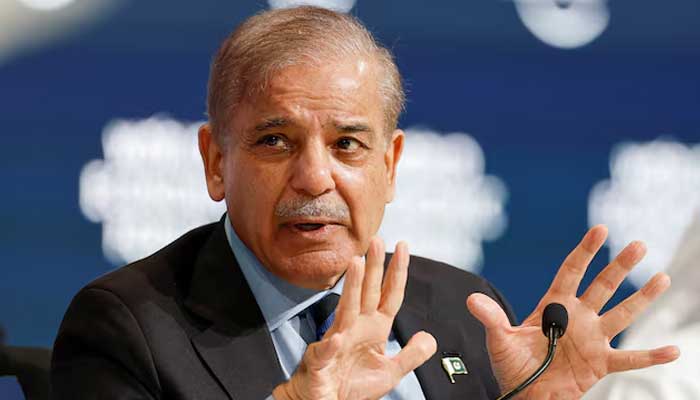PM hails lower inflation, Moody's upgrade as signs of economic stability
Govt cognisant of people's issues, striving to resolve them, premier says
ISLAMABAD: Prime Minister Shehbaz Sharif on Sunday expressed satisfaction with the recent decline in inflation rates and Pakistan's upgraded ratings by Moody’s, stating that the country’s economy is moving towards stability.
Welcoming the forecast that inflation may continue to decrease in September, the Prime Minister noted that the Consumer Price Index (CPI) dropped to a record low of 11% in July 2024, which is heartening to note, according to a statement from the Prime Minister’s Office (PMO).
The Ministry of Finance — in its monthly outlook report — stated that on account of stability in economic indicators, inflation was expected to remain within the range of 9.5-10.5% in August and further decline to 9-10% in September.
“After Fitch, a global rating agency, Moody’s recently upgraded Pakistan’s credit rating, which is an acknowledgement of the country’s positive economic indicators by the international financial institutions,” PM Shehbaz said in the statement.
The government is actively pursuing economic reforms, with rapid progress in implementing its rightsizing policy, which is being directly monitored by the Premier, according to the communique. The PM expressed confidence that the positive impact of these reforms on the economy would become visible soon.
He also highlighted that the federal and Punjab governments had provided significant relief to electricity consumers regarding monthly bills, adding that the prices of petroleum products were further reduced from today.
The Pakistan Muslim League-Nawaz (PML-N)-led government recently announced a reduction of Rs14 per unit in the electricity tariff for August and September under a power subsidy plan for consumers using 201 to 500 units.
"The government is committed to passing on the benefits of these policies to the public and is aware of the people’s issues, actively working to address them,” the premier said.
Earlier in August, Moody's Ratings upgraded Pakistan's local and foreign currency issuer and senior unsecured debt ratings to Caa2 from Caa3 owing to improvement in macroeconomic conditions.
“We have also upgraded the rating for the senior unsecured MTN programme to (P)Caa2 from (P)Caa3. Concurrently, the outlook for the Government of Pakistan has changed to positive from stable,” the rating agency said in a statement.
Accordingly, Pakistan's default risk has reduced to a level consistent with a Caa2 rating, as per Moody’s.
“There is now greater certainty on Pakistan's sources of external financing, following the sovereign's staff-level agreement with the IMF (International Monetary Fund) on 12 July 2024 for a 37-month Extended Fund Facility (EFF) of $7 billion.”
The release of the IMF's executive board's latest schedule is a significant development, but the absence of Pakistan's loan approval on the agenda is a cause of concern as the country must secure the loan to shore up its sinking economy.
On the other hand, the government is optimistic that the country will secure approval for a $7 billion bailout package from the IMF next month, sources privy to the matters told Geo News earlier this week.
Finance Minister Aurangzeb last week dismissed concerns about the IMF declining the staff-level agreement, exuding confidence that "the lender will approve it next month".
Pakistan and the global lender reached an agreement on the 37-month loan programme in July.
The IMF said the programme was subject to approval from its Executive Board and obtaining "timely confirmation of necessary financing assurances from Pakistan's development and bilateral partners".
-
Security forces gun down 30 terrorists in multiple IBOs in KP: ISPR
-
MQM-P calls for new province in Sindh
-
US report validates Pakistan military edge over India: PM
-
Banned TTP poses serious threat to Pakistan security: UNSC panel
-
CM Afridi clarifies remarks on by-poll after ECP requests army deployment
-
Dubai sees 3.2m Pakistani passengers in 2025 as airport sets new milestone
-
Security forces kill 23 Indian proxy terrorists in KP's Kurram
-
Pakistan to construct island to boost oil exploration: report












